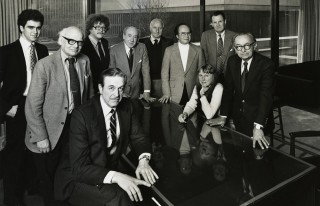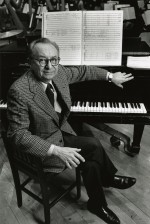Title
Subhead

Festival of Contemporary Music at Juilliard, January-February 1981. Standing: Ronald Caltabiano, Milton Babbitt, Eric Ewazen, David Diamond, Benjamin Lees, Lester Trimble, Francis Thorne, Persichetti; Seated: Peter Mennin, Marga Richter.
(Photo by Peter Schaaf; courtesy of the Juilliard Archives)Musicians who have taken a music theory class at Juilliard have most likely felt the spirit and influence of Vincent Persichetti. Dancers and actors have probably benefitted from his legacy through their music studies classes. Even though Persichetti died in 1987, his wit and imagination still pervade Juilliard’s approach to music through his former students, his ideas about teaching, and his compositions. On October 20, the Juilliard community will celebrate the 100th anniversary of Persichetti’s birth. The centerpiece will be an all-Persichetti concert featuring Juilliard faculty, students, and friends; a preconcert panel will feature Peter Schickele (MS ’60, composition), a Persichetti student, composer, and the impresario also known as P.D.Q. Bach. (Legend has it that when Schickele, as a student, made an infamous Tarzan swing entrance onto the stage, the administration grumbled that would be that last time he would appear at Juilliard. Fact or fiction, he’s had a storied career, and now, as always, Juilliard is delighted to welcome him back.) At the panel, Schickele and other Persichetti students and colleagues will tell stories and discuss the composer’s impact on the field.
Body
Vincent Persichetti was born in Philadelphia in 1915, and though he taught at Juilliard from 1947 until just before he died, he always lived in Philadelphia, commuting daily to teach here. Composer and music theory faculty member Michael White (MS ’59, composition) remembers that “whenever there was a traffic problem on the New Jersey Turnpike—every day!—Persichetti would pull out a huge drawing board, place it over the steering wheel, and proceed to work on any of the four compositions on his mind at the moment! You can imagine the look on the faces of most of his fellow drivers as they waited for the traffic tie-up to clear.” Asked about this, Persichetti would say, “I can’t afford to waste any time.” (Read Michael White's 1993 reminiscence about Persichetti here.)
Persichetti’s major achievements as a composer include a piano catalog of great beauty and depth, his famous Parables (solos for nearly every orchestral instrument), and a slate of symphonies, cantatas, and chamber works. In 1970 he was named head of Juilliard’s Literature and Materials of Music, or L&M, as the program was affectionately known. Every September, White recalled, students would line up “at 8am on the day of registration just to have a chance to be in his 20th-century class.” Bärli Nugent (BM ’76, MM ’77, flute), assistant dean and director of chamber music, said that Persichetti “really opened up my eyes and ears. He made music theory seem like a fun adventure rather than a scholarly obstacle.”
But Persichetti didn’t just teach theory. Faculty member and composer Michelle DiBucci (MM ’87, composition) recalls his “uncanny ability to not only sight-read my score on the spot at the piano, but then commit it to memory. Often, several months after reviewing a composition, he would remind me with astonishing precision of musical gestures or orchestral effects that I had used in the past.” Even those who didn’t study with him personally were impressed with his knowledge and positive energy. Composer Eric Ewazen (MM ’78, DMA ’80, composition), who studied with Milton Babbitt (faculty 1971-2008), recalled that Persichetti “thought being a composer at that time [the late 20th century] was the most exciting period of composition in history, simply because of the sheer variety of musical languages and vocabulary available to composers, from atonality to neo-Romanticism, from world music to minimalism to electronic music.” He added that Persichetti’s energy and enthusiasm “were addictive—and they influenced all who came in contact with him.” Current students and community members alike will have a chance to recapture that energy and enthusiasm at this celebration.
Want to share your memories of Persichetti? Write us at journal@juilliard.edu.





